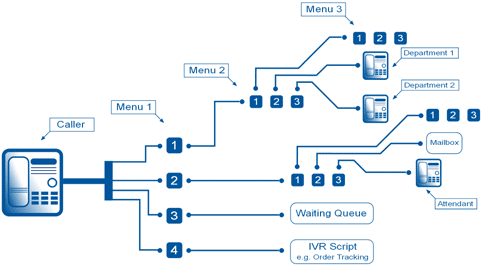Interactive Voice Response (IVR) System
(Redirected from Interactive Voice Response)
Jump to navigation
Jump to search
An Interactive Voice Response (IVR) System is a conversational system that can solve an IVR task (which include voice responses).
- AKA: IVR System.
- Context:
- It can (typically) be based on an IVR Platform (e.g. based on Nuance Recognizer).
- Example(s):
- a Touchtone IVR System, such as the one at 1-800-555-5555
- Counter-Example(s):
- See: Automated Attendant, Dual-Tone Multi-Frequency Signaling, Predictive Dialer.
References
2017
- (Wikipedia, 2017) ⇒ https://en.wikipedia.org/wiki/Interactive_voice_response Retrieved:2017-4-5.
- Interactive voice response (IVR) is a technology that allows a computer to interact with humans through the use of voice and DTMF tones input via keypad. In telecommunications, IVR allows customers to interact with a company’s host system via a telephone keypad or by speech recognition, after which services can be inquired about through the IVR dialogue. IVR systems can respond with prerecorded or dynamically generated audio to further direct users on how to proceed. IVR systems deployed in the network are sized to handle large call volumes and also used for outbound calling, as IVR systems are more intelligent than many predictive dialer systems. IVR systems can be used for mobile purchases, banking payments and services, retail orders, utilities, travel information and weather conditions. A common misconception refers to an automated attendant as an IVR. The terms are distinct and mean different things to traditional telecommunications professionals — the purpose of an IVR is to take input, process it, and return a result, whereas the job of an automated attendant is to route calls. The term voice response unit (VRU), is sometimes used as well.
2017
- http://www.nuance.com/for-business/automatic-speech-recognition/automated-ivr/index.htm
- QUOTE: Recognizer can transform your automated IVR into an intelligent, self-service system by turning a one-way dialogue into a conversation – making it faster and easier for customers to get things done.
2017
- http://www.nuance.com/for-business/customer-service-solutions/conversational-ivr/index.htm
- QUOTE: Touchtone and speech IVR might have been “good enough” in the past, but not anymore. Instead, conversational IVR engages callers using intelligent conversation: “Welcome back, Jim. Are you calling about the order you placed yesterday?”
Today, “easy” is the number one customer service demand – and a 20% increase in simplicity results in a 96% increase in loyalty. With nearly half of all customer service handled on the phone, an IVR that makes it easy for callers has a huge payoff.
- QUOTE: Touchtone and speech IVR might have been “good enough” in the past, but not anymore. Instead, conversational IVR engages callers using intelligent conversation: “Welcome back, Jim. Are you calling about the order you placed yesterday?”
20176
- http://asttecs.com/ivr-system/
- QUOTE:

- IVR technology is most commonly found in the call centers of companies seeking to improve their customer service, reduce costs, and expand their call center operations. IVR can help:
- handle high call volumes
- service customers after normal business hours
- improve customer service
- lower call center costs
- prioritize customers so urgent calls are handled quickly
- automate an outbound call campaign
- Key IVR Benefits
- Intelligent call routing allows your customers to reach the right agent every time.
- Integrate your IVR system with internal applications to improve your call center operations.
- Expand your ability to get feedback from customers with surveys that populate your database from your IVR solution.
- Advanced call routing allows your team to be accessible via cell, land line, or even another IVR system.
- Reduce idle time in your call center with outbound campaign management.
- What to look for in an IVR solution
The best IVR solutions should do more than detect voice and keypad inputs. An IVR solution should be a critical application that can scale with your business needs. Below are just a few of the things you should look for in an IVR solution:
- Simple management tools that make IVR changes in real-time.
- Scalability to handle a virtually unlimited number of calls.
- robust, real-time monitoring and reporting.
- Integration with your back end applications and databases.
- Easy, quick deployment.
- IVR technology is most commonly found in the call centers of companies seeking to improve their customer service, reduce costs, and expand their call center operations. IVR can help:
- QUOTE: